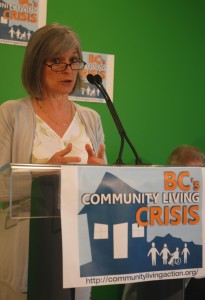Community Living Action Group issues report, solution for growing crisis
Premier Clark urged to listen, put families first again
MOMS joined other family and community living organizations today at a media event to launch a major report and recommendations urging BC's new Premier, Christy Clark, to honour promises to listen and to start putting families first again.
The report was the result of broad community discussions, including two major public forums hosted in Victoria and Vancouver last fall, when community living groups came together to respond to growing complaints about cuts, forced relocations, denial of services and choices, and the exclusion of adults and their families from crucial life decisions.
The report reflects an unprecedented consensus among all major partners in community living -- agencies, families, self-advocates and employee groups -- and focusses on solutions that emerged from the community dialogue launched last fall. (See more details below)
Please visit the website of our community partnership, the BC Community Living Action Group , to view the report, recommendations and other information about this initiative.
Please join us!
We urge families to support our campaign by calling on BC's new Premier, Christy Clark, to honour her promises to start listening and to put families first again.
On May 19, 2004, Ms. Clark, who was then BC's Deputy Premier and Minister for Child & Family Development, introduced Bil 45, the legislation that created Community Living BC. In doing so, she promised:
"This legislation gives British Columbians with developmental disabilities and their families better options and more opportunities in their communities. They'll be able to look forward to a safer, healthier and better quality of life."
( http://www.leg.bc.ca/hansard/37th5th/h40519p.htm - page 11234)
Today the provincial government, through CLBC, is violating all of those promises, with services and choices eroded and families and adults with developmental disabilities excluded from critical decisions. The result is growing concerns about safety, quality of life and the lack of independent oversight, monitoring and public reporting in this vulnerable sector.
Ms Clark, who returned to political life in February when she was elected by her party to succeed retired Premier Gordon Campbell, will be running in a byelection in Vancouver Point Grey on May 11.
- Contact Premier Christy Clark
Premier Clark will be running against civil rights activist David Eby in the Point Grey byelection.
Key facts about community living
- In the decade from 2003 to 2013, the number of people requiring CLBC services will have risen by 60%. During the same period, after accounting for inflation, the provincial budget for community living has remained essentially static.
-
The BC budget for CLBC is around $700 million a year. That's a small fraction of the costs of care, housing and supports that BC families are funding out of their own pockets.
In 2010, CLBC launched a "service redesign" initiative to reduce the costs of services after the Province ordered it to find another $22 million in savings. - Thirty-three group homes were closed in Victoria, Maple Ridge, Chilliwack, Surrey, Kamloops, Williams Lake, and Terrace between March 31 and December 31, 2010. If the closures continue at this pace, BC-CLAG estimates that one in three B.C. group homes serving adults with developmental disabilities will have closed by 2016.
- Respite, day programs, budgets for home share/pri care and other supports have also been cut, leaving agencies, caregivers, families and adults struggling to cope. Many individuals are lengthy waitlists or face significantly reduced choices when they are finally able to access services.
Key recommendations from the BC Community Living Action Group Report
- Increase provincial funding to meet the support needs of adults with developmental disabilities and their families, and allocate funding equitably and strategically.
- Create an independent advocate with a broad legislated mandate to improve supports and outcomes for adults with developmental disabilities by providing oversight, monitoring and public reporting.
- Include individuals and families in decision making by listening, by offering meaningful choices and by respecting their diverse and changing needs.
- Consult and collaborate with service agencies, front-line workers, disability advocates, and other stakeholders with key knowledge and expertise.
- Introduce provincial legislation setting out the inclusion rights and support entitlements of adults with developmental disabilities.
